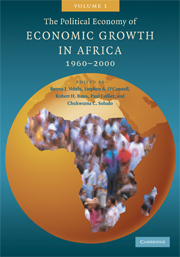Foreword
Published online by Cambridge University Press: 09 January 2010
Summary
Throughout many of the first decades following independence, Africa's economies failed to grow; indeed in 2000 per capita incomes in several countries were lower than they had been in 1960. In this two-volume study, the African Economic Research Consortium (AERC) probes the nature and the roots of Africa's economic performance in the first decades of independence. We seek to describe Africa's growth experience in the latter decades of the twentieth century, to account for it, and to extract lessons to guide future policy-making in the continent.
The timing of this two-volume assessment could not be more propitious. Debates over growth strategy have renewed as the region emerges from decades of economic decline and policy reform. Growth itself reignited in the mid-1990s, supported by policy reforms and also by rising commodity prices, a revival of aid flows, and the resolution of costly civil conflicts. What constitutes a pro-growth policy environment? What constrains the achievement of that environment? These questions were central to this examination of Africa's immediate past. The answers to them should feature in debates over how best to secure its economic future.
We all recognize that the forces out of our control – the vagaries of commodity prices and climatic conditions, the rigors of fierce competition in fast-changing global markets, and the uncertainties of donor priorities and commitments – place limits on what we can attain. Even at the domestic level, important factors constrain our choices.
- Type
- Chapter
- Information
- The Political Economy of Economic Growth in Africa, 1960–2000 , pp. xv - xviiPublisher: Cambridge University PressPrint publication year: 2007



